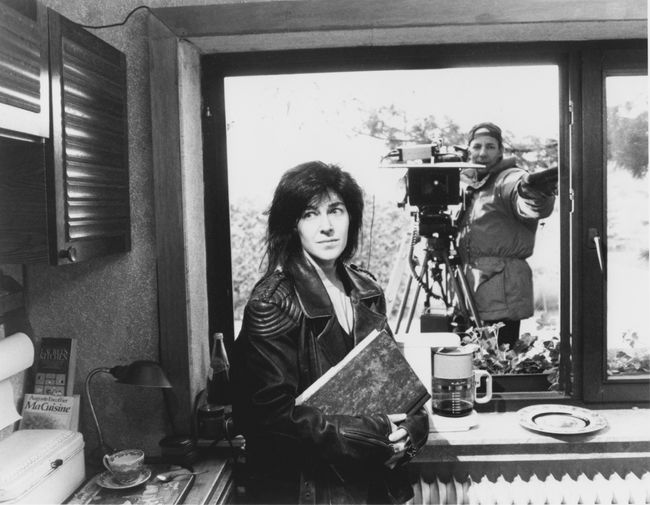Shake-Up
15 January 2020
How collectives take over the world.
Written by Inge de Leeuw
How Collectives Take Over the World
It seemed that 2019 was the year in which collectives took over the world. There was an extraordinary amount of attention for artist collectives in the news: from appointing collectives as curators for prestigious art events, such as ruangrupa for documenta 15 and Isuma for the Canadian Pavilion during the 58th Venice Biennial, solo shows in prominent museums such as Karrabing in MoMA PS1, to the commotion about the brand-new collective that won the Turner Prize last December. In addition, several new filmmaker and artist collectives were established in 2019, such as The Ummah Chroma, who introduced themselves in January with their film AS TOLD TO G/D THYSELF. And let’s not forget the numerous collectives that started (long) before 2019. Many of these created new works in 2019, such as three African collectives, each of which made a film commissioned by IFFR.
It Starts with Community
Our society has been in transition for several years now, and we are seeing the world around us changing as a result. One example is the decentralization of the dominant narrative now prioritised in policies and institutions. In addition, we are seeing – perhaps as a result of various worldwide protest movements – an emerging awareness of the need for more diverse representation in film, media and other disciplines. In response to these social and political changes, we are seeing a shift from an individual model to a model based on collectivity, perhaps more appropriate for this time. By decentralising the role of the artist, filmmaker and curator, traditional concepts and ideas of authorship, ownership and gatekeepers are being upended. All these factors make it a very timely moment to bring together different collectives and their work in the thematic programme Synergetic.
Throughout history, artists and filmmakers have united around identities that are ignored or underrepresented by the mainstream. This is still the case in the work of contemporary collectives; most of the collectives in this programme started from an urgent need within their communities to tell their own stories and claim their place in the mainstream narrative. Not only do collectives present alternative stories and histories, they are also often at the forefront of innovation. Communities and independent organisations are open to experimentation, and the interdisciplinary nature of many collectives, plus the worldwide platforms and technology which make physical distance within collectives workable, provide fertile breeding ground for innovation and collaboration. In the collectives that are part of this programme, we find a combination of these various factors in the working methods and subjects they address.
Alternative Perspectives
In the cinema, new and recent examples of work by collectives from around the world are being presented. The Nest Collective from Kenya, Negrume from Cape Verde and Geração 80 from Angola will each premiere a new work this year commissioned by IFFR. There is a one-off screening of The End Will Be Spectacular by the Rojava Film Commune, who were driven out of their towns and villages after the recent Turkish occupation of Northern Syria. They also tell their story in the annual Freedom Lecture organised in collaboration with De Balie. Eyeslicer will be back with Season 2, once again creating a filmmaking community for American independent filmmakers as an alternative to the mainstream film industry. And in addition to the presentation of the feature film One Day in the Life of Noah Piugattuk, Isuma curates an online selection of their films especially for IFFR’s Unleashed. The Ummah Chroma is also present. Not only will the films be shown in cinemas, but this year IFFR in collaboration with Het Nieuwe Instituut is presenting The Ummah Chroma’s installation G/D THYSELF: Spirit Strategy On Raising Free Black Children.
Possible Futures
Synergetic is also looking at the future: young people creating work together in communities and alternative film programmes. The Collective Space is a programme with workshops and masterclasses for local talent and students from international film programmes aimed at stimulating mutual inspiration, exchange of ideas and co-creation. The masterclasses and talks by renowned professionals are also open for the audience to attend.
The Past and the Present
Exactly ten years ago, in 2010, IFFR hosted Kino Climates, which aimed to propose a map of independent cinemas in Europe during the first decade of the new millennium. Following the closure of a large number of arthouses and repertory cinemas in the 1980s and 1990s, an impressive array of alternative practices in film curatorship and programming have emerged over the years, together with a re-appropriation of urban spaces and the conversion of these into new types of hybrid cinemas. Whether permanent or temporary, these venues dedicated to a new cinephilia, and often resulting from collective processes, were and still are an underestimated reality that lies between the film festival circuit and the commercial film sector.
Ten years later, Kino Climates is back! Meanwhile, it has turned into a permanent network. What has changed since? A day-long programme of film screenings, debates, performances and book presentations.
IFFR Pro also focuses on collectives this year in several programmes, see Sessions, Critics’ Choice and Reality Check. A programme by Peter van Hoof and Inge de Leeuw, in collaboration with Het Nieuwe Instituut.







